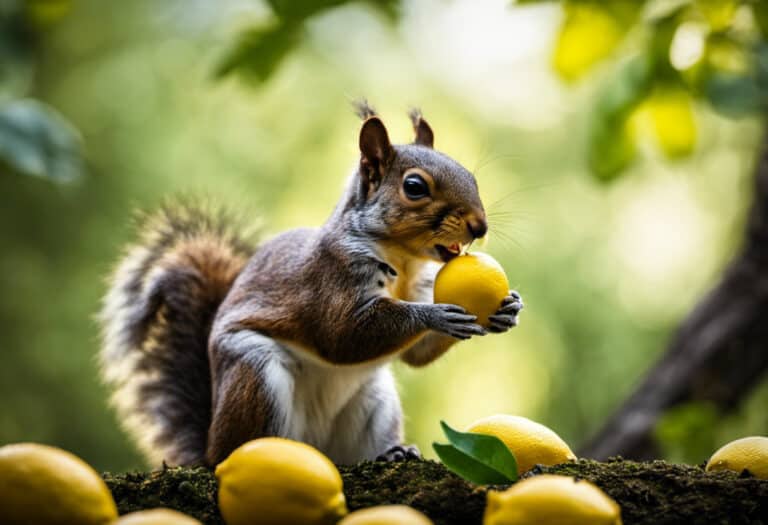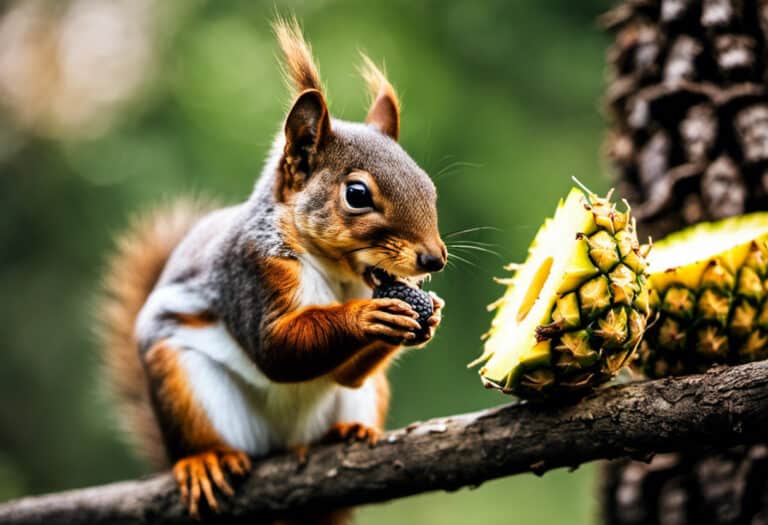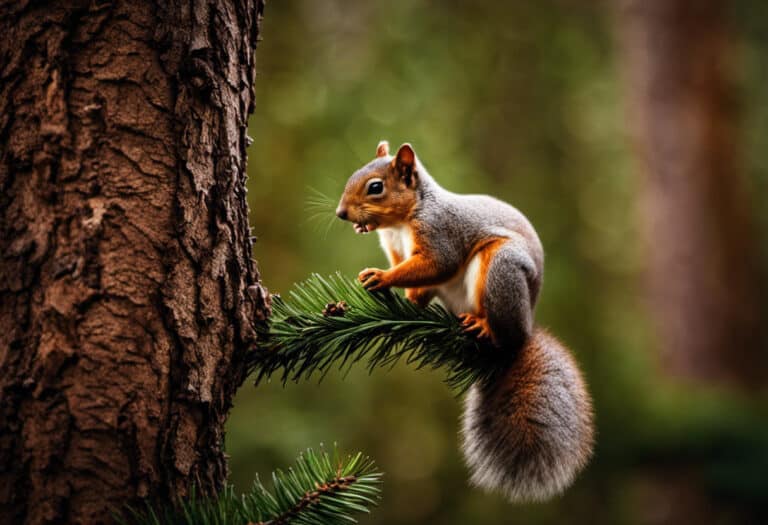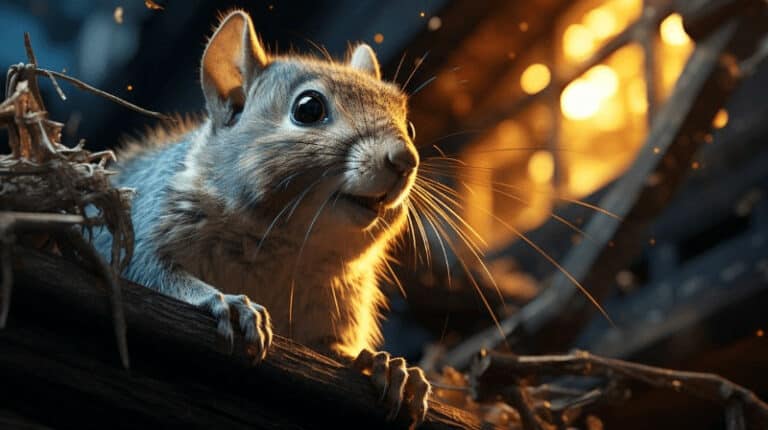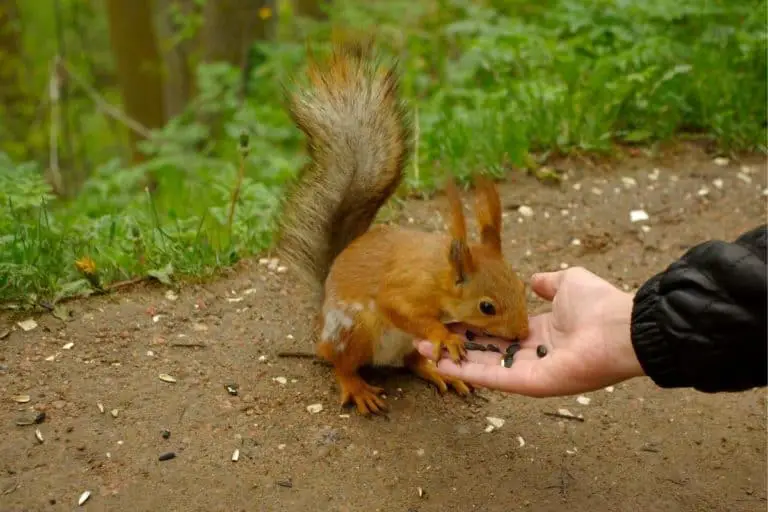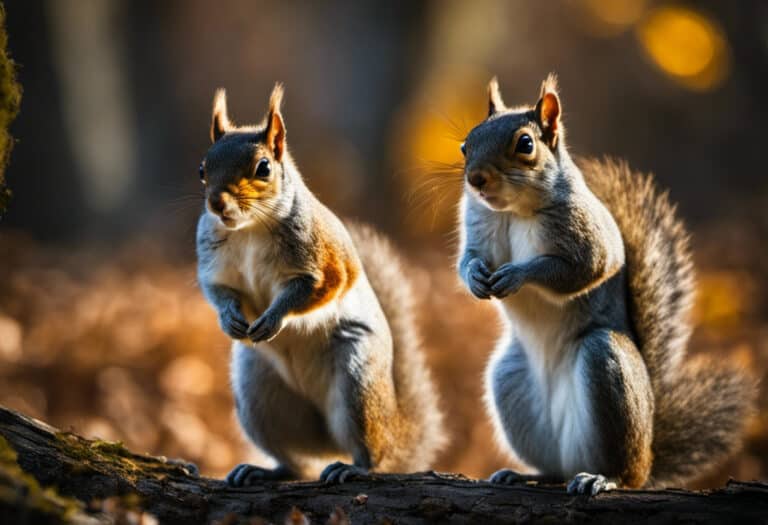What Do Squirrels Eat in the Wild? A Comprehensive Guide
Did you know that squirrels have a diverse and surprising diet? These agile little creatures are not just nut enthusiasts! In the wild, squirrels munch on more than just nuts; their menu includes seeds, fruits, and insects.
It’s fascinating how their eating habits vary depending on the season and the availability of food sources. Understanding what squirrels eat in the wild is crucial for providing them with appropriate nutrition, especially when kept in captivity.
Feeding these wild animals requires knowledge of their natural diet to ensure a balanced and healthy meal plan.
We can help maintain their overall well-being by replicating their omnivorous eating habits. Knowing the dietary needs of squirrels is essential for squirrel enthusiasts and those considering adopting one as a pet. Feeding squirrels with a feeder is crucial to provide them with the necessary insects.
We’ll explore their diverse diet and explain why it matters to captive and wild squirrels. So, let’s dive right in!
Squirrel Diet: Facts and Variations
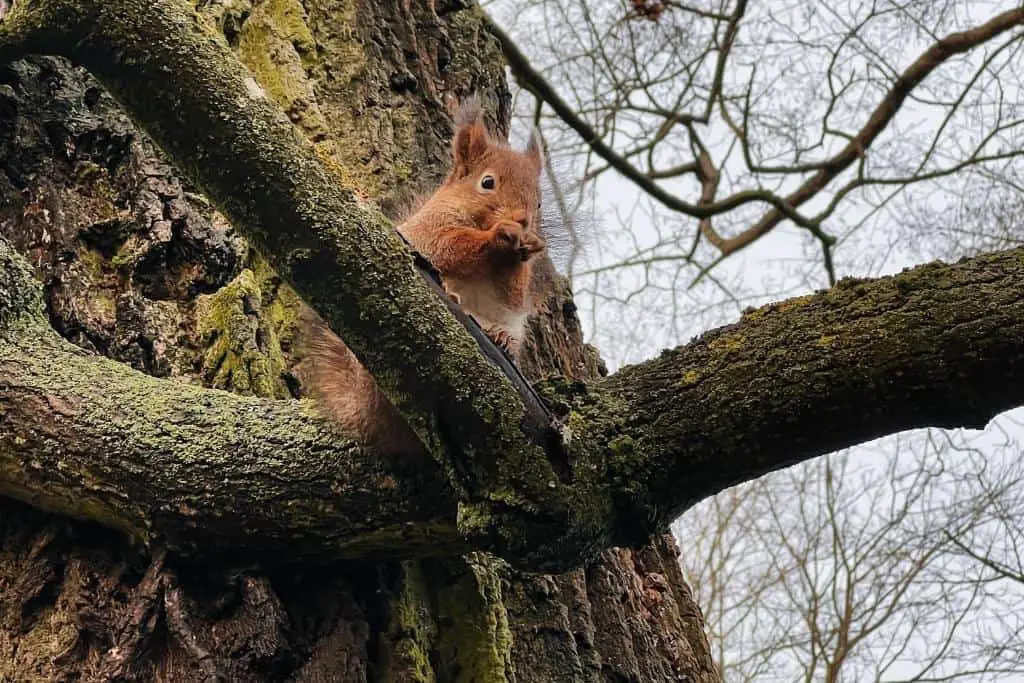
Squirrels, those adorable creatures that scamper through our yards and parks, have various dietary preferences.
As omnivores, squirrels can feed on plant- and animal-based foods, making them versatile. Let’s explore the fascinating world of squirrel diets and discover some interesting facts about these furry little foragers.
Specific Dietary Preferences
Different squirrel species exhibit specific dietary preferences that set them apart from one another. For instance, gray squirrels are known for their fondness for acorns.
These clever critters will go to great lengths to gather and store this nutty delicacy. They bury acorns throughout their territory, creating hidden caches that serve as a winter food supply.
Other squirrel species also display unique dietary habits. Red squirrels, for example, have a penchant for pinecones.
They deftly pry open the scales of pinecones to access the seeds nestled inside, providing them with a nutritious meal. Flying squirrels enjoy indulging in fungi, such as mushrooms, which provide essential vitamins and minerals.
Diet Variation Based on Habitat
The diet of squirrels can vary depending on their habitat and geographical location. Urban-dwelling squirrels often adapt their eating habits to include human-provided food sources such as bird feeders or discarded snacks. This adaptation allows them to thrive in environments with scarce natural food sources.
In contrast, squirrels living in forested areas have many options. Alongside nuts like acorns or pinecones, they feast on various tree seeds including walnuts, hickory nuts, maple seeds (also known as “helicopters”), and beech nuts.
An Array of Foods
While specific preferences exist among squirrel species based on their habitats or geographical locations, it is important to note that overall, squirrels consume a wide variety of foods.
Here are some common examples:
- Nuts: Squirrels have an impressive ability to crack open nuts using their sharp incisors. They enjoy munching on nuts, including acorns, hazelnuts, pecans, and almonds.
- Seeds: Various seeds comprise a significant portion of a squirrel’s diet. Sunflowers, pumpkins, and sesame seeds are all fair game for these resourceful rodents.
- Fruits: Squirrels have been known to indulge in fruits such as apples, berries, cherries, and even citrus fruits when available.
- Insects and Small Animals: While plant-based foods dominate their diet, squirrels occasionally supplement it with insects like caterpillars or small animals like bird eggs.
Nuts: Staple Food for Wild Squirrels
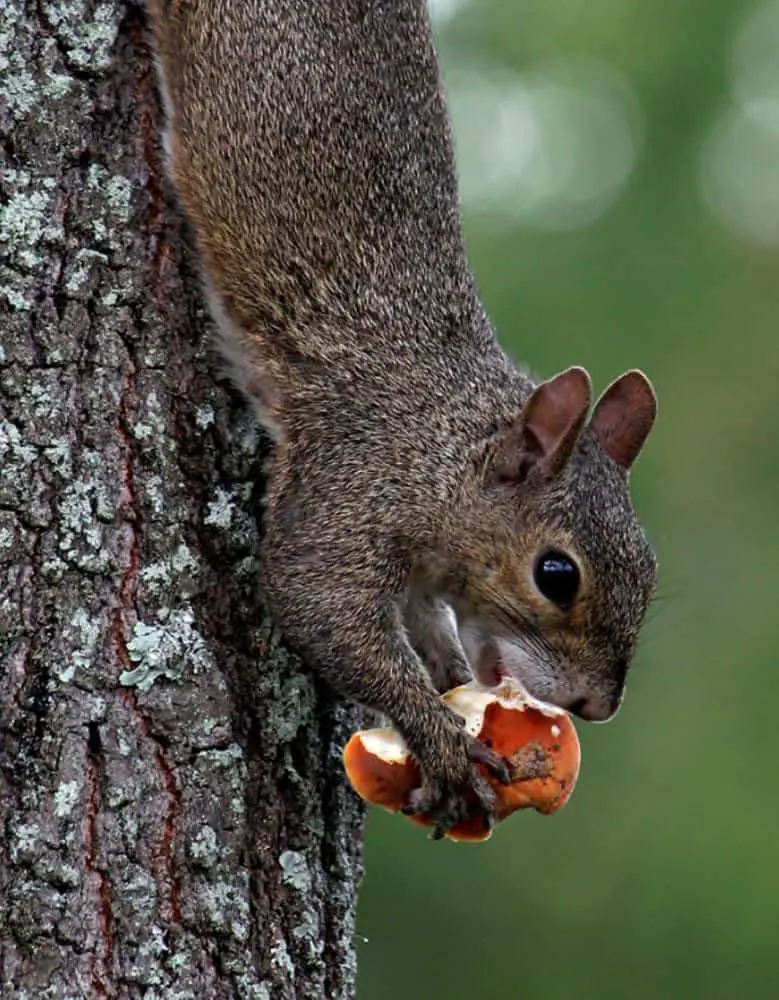
Nuts play a vital role in the diet of wild squirrels, serving as a staple food source for many species. These resourceful creatures have developed specialized teeth that allow them to easily crack open nut shells, accessing the nutrient-rich goodness inside.
Squirrels are fond of various types of nuts, including acorns, walnuts, and hickory nuts. Acorns are especially popular among these furry foragers due to their abundance in wooded areas.
With their sharp incisors and strong jaws, squirrels skillfully break through the tough outer shell of acorns to reach the nutritious kernel within.
In addition to acorns, walnuts are another beloved nut variety among wild squirrels. The hard exterior of walnuts presents a challenge that these agile climbers gladly embrace.
They adeptly manipulate the walnut with their dexterous paws and nimble fingers until it yields its delicious prize.
Hickory nuts also make it onto the menu for squirrels in the wild. These large nuts have a rich flavor and high nutritional value, appealing to these small arboreal creatures.
Squirrels employ patience and persistence as they diligently extract every last bit of nourishment from hickory nuts.
One fascinating behavior exhibited by squirrels is their tendency to store excess nuts in hidden locations during times of plenty.
This behavior helps them build up reserves to sustain them through leaner periods, such as winter, when food sources become scarce. By burying or hiding nuts in various spots throughout their territory, squirrels create a natural pantry from which they can retrieve sustenance when needed.
While many squirrel species favor acorns, walnuts, and hickory nuts, it is worth noting that different squirrels may show preferences for specific nut varieties based on availability and habitat conditions.
For instance, ground squirrels often rely on peanuts as a primary food source due to their accessibility in cultivated areas.
Nuts offer an array of essential nutrients that contribute to squirrels’ overall health and well-being.
These small packages contain protein, fiber, healthy fats, vitamins, and minerals. The nutritional value of nuts provides squirrels with the energy they need for their daily activities, including climbing trees and scurrying across branches at impressive speeds.
Seasonal Variations in Squirrel Diet
Squirrels are known for their varied diet, adapting their food choices to the changing seasons.
From fresh fruits and berries to nuts and seeds, these resourceful creatures have developed a remarkable ability to find sustenance in different environments. Let’s explore how squirrels’ dietary preferences shift throughout the year.
In spring and summer, squirrels take full advantage of nature’s bounty. They indulge in various fresh fruits, such as apples, cherries, and grapes, that grow abundantly during this time.
These juicy treats provide essential nutrients while satisfying their taste buds. Squirrels feast on succulent berries like strawberries and blueberries, relishing their sweetness.
Alongside fruits, tender plant shoots become a regular part of their diet during these warmer months. The availability of such vegetation contributes to the diversity and richness of their meals.
As autumn approaches and temperatures cool, squirrels focus on gathering nuts and seeds. This behavior is driven by the need to accumulate fat reserves for the upcoming winter months when food becomes scarce.
Squirrels particularly favor acorns from oak trees due to their high nutritional content. They diligently collect these nutty treasures and stash them away in hidden caches for later consumption.
Winter presents a challenging period for squirrels as natural food sources dwindle significantly. During this season, they heavily rely on stored food or resort to scavenging dormant buds or bark for sustenance.
Their ability to remember where they buried acorns comes into play as they navigate through snow-covered landscapes searching for hidden caches containing vital nourishment.
Despite the scarcity of options during winter, squirrels still maintain a balanced diet by incorporating whatever resources are available.
While seeds from coniferous trees serve as an alternative source of nutrition during this time, they may also consume fungi found beneath fallen leaves or even nibble on tree bark. This adaptability showcases their resilience and survival instincts.
Bird’s Eggs: Can Squirrels Eat Them?
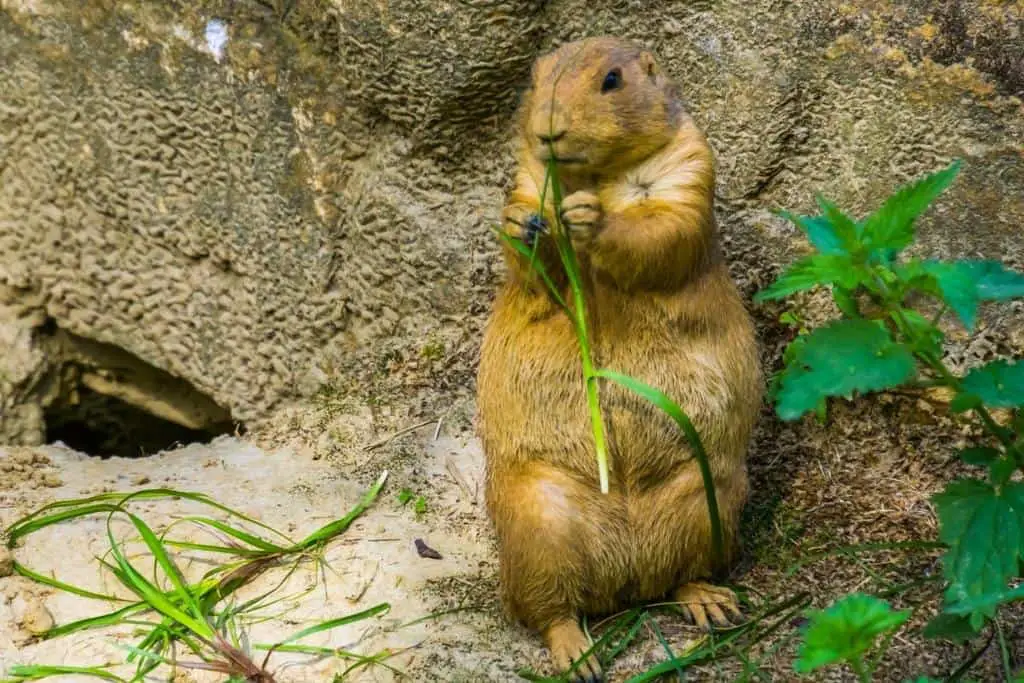
While squirrels are primarily herbivorous, some opportunistic individuals may occasionally eat bird eggs if available. However, this behavior is not common among all squirrel species or individuals within a population.
Squirrels are known for their preference for nuts, seeds, fruits, and vegetables. These plant-based foods give them the necessary nutrients and energy to thrive in their natural habitat. However, squirrels are opportunistic feeders and will explore other food sources when possible.
In certain circumstances, squirrels may come across bird nests containing eggs during their food search. Some squirrels may take advantage of the readily available protein-rich meal when this happens. It is important to note that not all squirrel species exhibit this behavior, and even among those that do, it is not common.
The consumption of bird eggs by squirrels can have implications for both the birds and the squirrels themselves. For birds, losing their eggs to squirrels can harm their reproductive success. The loss of an egg can disrupt the nesting process and lead to declining bird populations.
To protect bird nests from squirrels and ensure successful nesting, several measures can be taken:
- Installing predator guards: Placing barriers around tree trunks or nest boxes can prevent squirrels from accessing bird nests.
- Providing alternative food sources: You can divert their attention away from bird nests by offering ample food options, such as feeders filled with seeds or nuts specifically designed for squirrels nearby.
- Creating decoy nests: Setting up decoy nests away from vulnerable areas can attract squirrels’ attention and keep them occupied while leaving actual bird nests undisturbed.
- Natural deterrents: Some natural substances like cayenne pepper or predator urine can be used around nest sites to discourage squirrel activity.
By implementing these strategies, you can help protect bird nests and minimize the chances of squirrels consuming bird eggs. It is crucial to balance preserving the natural behavior of squirrels while ensuring the survival of bird species.
Squirrel-Friendly Bird Feeders and Recommended Foods
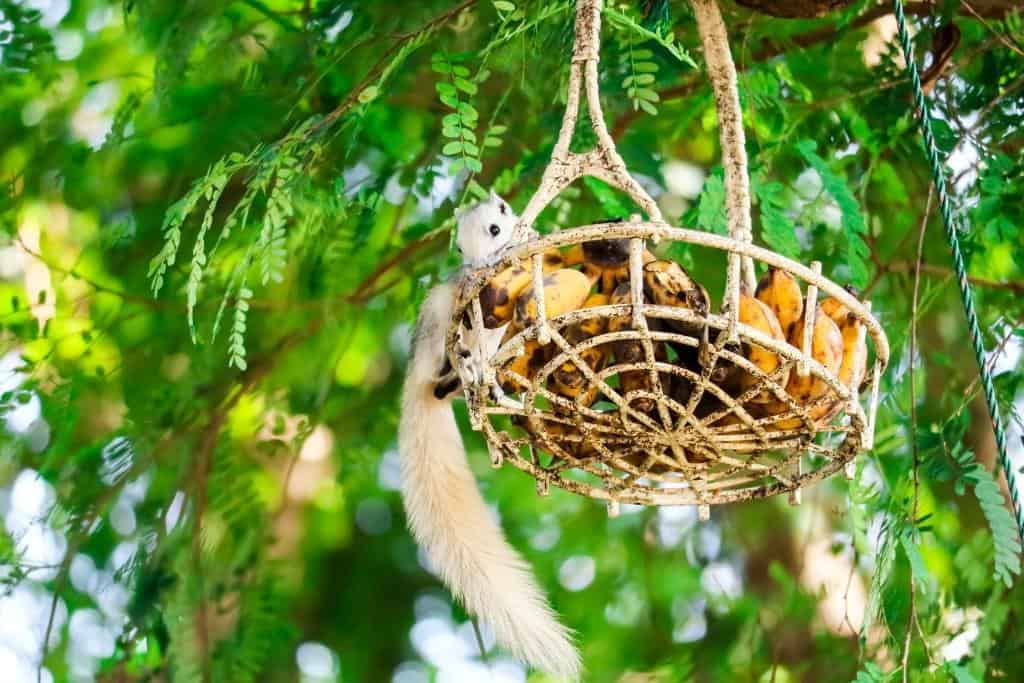
To attract squirrels away from bird feeders, it’s important to provide them with designated feeding stations filled with nuts and seeds. By doing so, you can ensure that the birds and the squirrels have ample food sources without competing for the same resources.
Squirrels love a variety of foods, but some of their favorites include sunflower seeds, corn, and peanuts. These can be offered separately from the bird feeders in squirrel-specific feeders or platforms. This way, you can cater to their dietary preferences while minimizing conflicts between squirrels and birds.
When choosing a squirrel feeder, opt for those designed to be squirrel-proof, or consider adding baffles to your existing feeders. Squirrels are notorious for their acrobatic skills. Taking precautions will help ensure they don’t raid your bird feeders.
In addition to providing suitable foods for squirrels, it’s also essential to discourage them from consuming junk food. Like humans, squirrels can develop unhealthy eating habits if they rely too heavily on processed or high-sugar foods. Stick to natural options such as nuts and seeds instead of offering them human snacks like chips or candies.
Creating a welcoming space for squirrels in your backyard is enjoyable and beneficial for these adorable creatures. However, it’s important to note that some parks may have regulations regarding feeding wildlife. Always check local guidelines before setting up squirrel-friendly feeding stations outside your home.
There are plenty of options available. You can find ready-made squirrel feeders made from durable materials such as metal or plastic at garden centers or online stores. Alternatively, you could make your DIY feeder using recycled materials like old wooden pallets or plastic containers.
If you’re unsure what foods squirrels enjoy, a quick online search or visit your local library can provide you with a comprehensive guide. There are numerous resources available that offer detailed information on squirrel feeding habits and their favorite foods.
Flowers and Buds in a Squirrel’s Diet
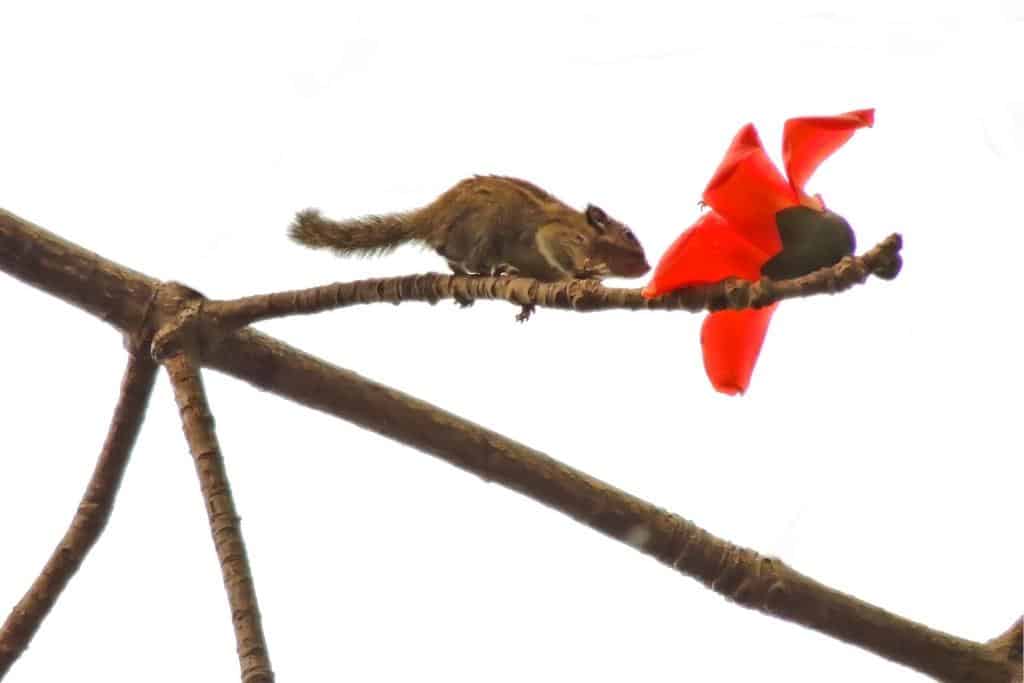
Squirrels are known for their varied diet, including a wide range of foods in their natural habitat. One important component of a squirrel’s diet is flowers and buds, particularly during the spring when these food sources are abundant.
During this season, squirrels enjoy the blooming flowers and feast on their nectar-rich blooms. As they feed on the flowers, these furry creatures inadvertently contribute to pollination by transferring pollen from one flower to another. This unintentional act helps plants reproduce and ensures the continuation of various species.
However, while squirrels contribute to pollination, excessive consumption of flower bulbs can be detrimental to garden plants. They may dig up flower bulbs or nibble on them, causing damage that can hinder plant growth and blooming. Gardeners often face challenges when protecting their cherished plants from these voracious eaters.
Apart from flowers, squirrels also consume buds as part of their diet. Buds contain essential nutrients that support the squirrels’ overall health and well-being. These tiny packages hold immense potential for growth as they contain all the necessary components required for new leaves or flowers to sprout.
In addition to flowers and buds, squirrels rely heavily on seeds as a staple food source. Tree squirrels often gather nuts such as acorns or walnuts and bury them for future consumption during leaner times. Flying squirrels have been observed feeding on birdseed left out by humans, especially sunflower seeds, which are highly nutritious.
Squirrels are opportunistic eaters and will adapt their diet based on what is available in their surroundings. Apart from plant material like flowers, buds, seeds, and sprouts, they also consume mushrooms and green vegetation such as leaves from trees or shrubs.
While it is fascinating to observe what squirrels eat in the wild, it is equally important to understand their role in maintaining the balance of their habitat. By consuming flowers, squirrels inadvertently aid in pollination, ensuring the survival and diversity of plant species. Their diet of seeds and vegetation contributes to the dispersal of plants across different areas.
Tips for Feeding Squirrels and Foods to Avoid
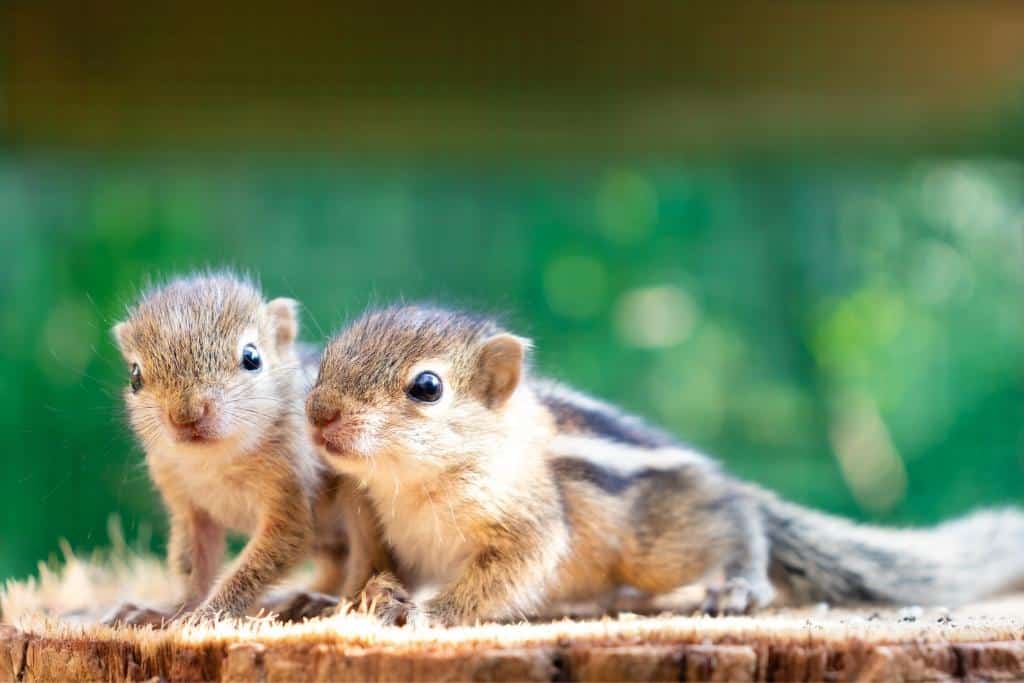
Squirrels are adorable creatures that can bring joy to any backyard or park. If you want to attract them to your space, it’s important to offer them a variety of foods that will keep them healthy and happy. Here are some tips on feeding squirrels and what foods to avoid.
Offer a Variety of Foods
To ensure squirrels have a balanced diet, providing them with a range of food options is crucial. This way, they can get all the necessary nutrients they need.
Fruits such as apples, berries, and bananas make great choices as they are packed with vitamins and natural sugars that give squirrels an energy boost. Vegetables like carrots, broccoli, and peas are also excellent additions as they provide essential minerals.
Nuts and seeds are another vital part of a squirrel’s diet. These little critters love munching on almonds, walnuts, sunflower, and pumpkin seeds. These snacks taste delicious and contain healthy fats that help squirrels maintain their energy levels throughout the day.
Avoid Processed or Salty Foods
While sharing your favorite processed snacks with squirrels may be tempting, it is best avoided. Processed foods often contain high amounts of sugar, salt, and preservatives that can harm these furry creatures’ health in the long run. Salty foods can cause dehydration in squirrels since their bodies cannot handle excessive sodium intake.
It’s important to remember that squirrels have different dietary needs than humans do. Opt for natural alternatives instead of reaching for processed treats like chips or cookies when feeding squirrels.
Provide Natural Food Sources
Although artificial squirrel feed is readily available in stores, relying solely on these products may not be the best option for these animals’ overall well-being. While commercial feeds might seem convenient at first glance, they often lack the nutritional value and diversity that natural food sources offer.
Instead of relying solely on artificial squirrel feed, try to create a squirrel-friendly environment by planting trees and shrubs that produce nuts and fruits. Acorns, hickory nuts, pine cones, and berries are all excellent choices. This way, you can allow squirrels to forage for their own food, imitating their natural behavior in the wild.
By offering a variety of foods such as fruits, vegetables, nuts, and seeds, you can ensure that squirrels receive a well-rounded diet.
Avoiding processed or salty foods is crucial for their health. Providing natural food sources rather than relying solely on artificial squirrel feed allows these adorable creatures to act instinctually while enjoying a tasty meal. So go ahead and make your backyard or park a haven for squirrels by offering them the right kind of food!
FAQs
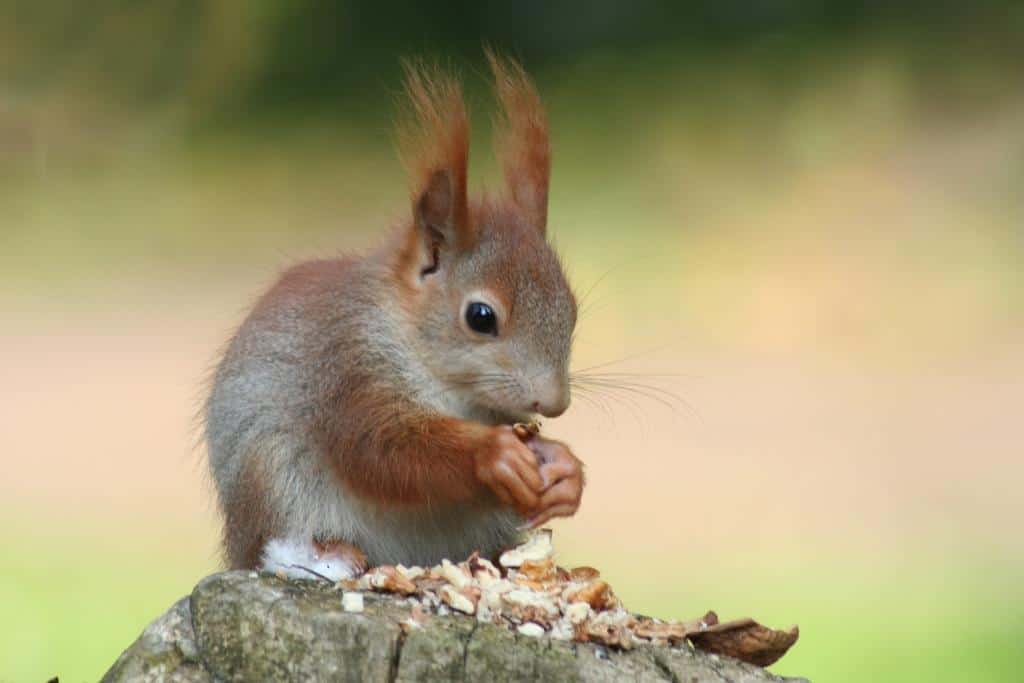
Can I feed squirrels bread?
While bread may seem easy to feed squirrels, it is not the best choice for their nutrition. Bread lacks essential nutrients and fiber that squirrels need in their diet. It may fill them up temporarily but does not provide the necessary sustenance for their overall health.
What fruits do squirrels eat?
Squirrels enjoy apples, pears, berries (strawberries, blueberries), peaches, plums, and grapes. These fruits offer natural sugars, vitamins, and minerals that contribute to the squirrel’s well-being.
Are peanuts safe for squirrels?
Peanuts are generally safe for squirrels when offered in moderation. However, avoiding salted or flavored peanuts is essential, as excessive sodium or artificial additives can harm the squirrels. Plain, unsalted peanuts are the best option.
Can squirrels eat chocolate?
No, squirrels should not consume chocolate. Chocolate contains theobromine, which is toxic to many animals, including squirrels. It can cause various health issues and even be fatal for them. So, it’s best to keep all forms of chocolate away from these furry creatures.
How can I discourage squirrels from raiding my bird feeders?
To deter squirrels from raiding your bird feeders, you can try using squirrel-proof feeders with mechanisms to prevent food access. Placing the feeders away from trees or other structures that squirrels could use as launching points can make reaching the food more challenging.
